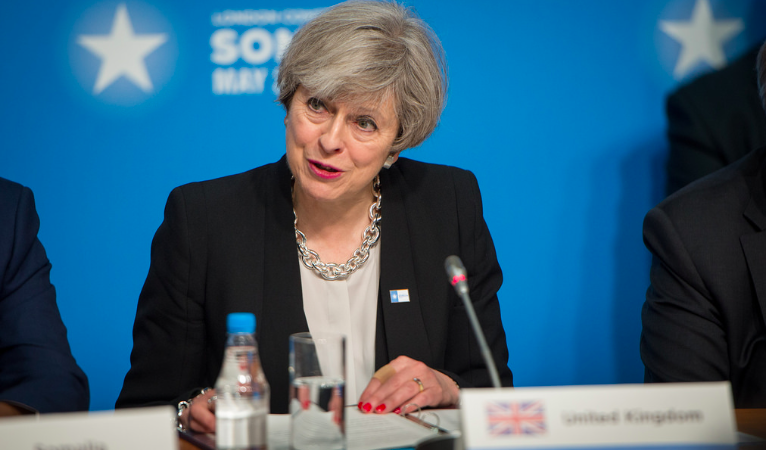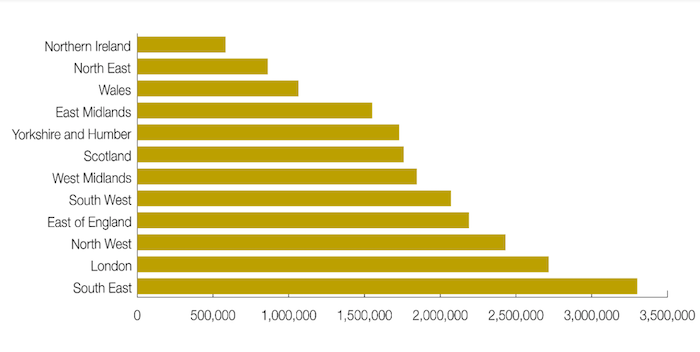First-past-the-post is so broken that the Tories would have won a majority in the House of Commons if they'd picked up just 533 more votes.

At the last general election 68 per cent of votes were ‘wasted’, having no impact on the overall result, because of our regressive voting system, a new report claims.
Astoundingly, the Tories would have won a majority in the House of Commons if they’d picked up just 533 more votes — or 0.0016 per cent of voters — in nine marginal constituencies, the report by the Electoral Reform Society (ERS) showed.
Despite winning just 42 per cent of the popular vote in June, the Conservatives gained 49 per cent of the seats in the House of Commons.
In being geared to representing votes at a constituency rather than national level, our electoral system, first-past-the-post (FPTP), is failing to “fairly represent and give voice to this range of voter preferences”, the ERS said.

Look at the results geographically, and they appear even more unrepresentative: for example, Labour secured 29% of South East vote but got just 10% of seats, while Conservatives won 34% of the North East vote but got just 9% of seats. The ERS commented:
“By placing electoral outcomes in the hands of a small number of voters in a few select places, the electoral system is creating an ever more unpredictable electoral environment”
To put FPTP in context, the election would have been won by Labour had the ballot of been carried out under an alternative voting system, the ERS showed.
If the poll had been carried out under the single transferable vote (STV), Labour would have won 297 seats, the Tories 283, the Lib Dems 29 and the SNP 18.
In addition to how unbalanced our voting system is, it also creates increasingly volatile and unpredictable results.
The movement of votes between parties is at its highest second highest level since 1931 (the highest was in 2015).
“We are witnessing huge changes in partisan alignment and our system is struggling to keep up”
“By placing electoral outcomes in the hands of a small number of voters in a few select places, the electoral system is creating an ever more unpredictable electoral environment.”
The Electoral Reform Society dubbed the 2017 poll the “hold your nose” election, after an estimated 6.5 million people voted tactically — double the estimated 2015 figure — attempting to ‘game’ the system.
They found that 20 per cent of the people they interviewed chose a candidate who was likely to beat the one they disliked, rather than voting for their first preference.
“June’s election has shown first-past-the-post is unable to cope with people’s changing voting habits – forcing citizens and parties to try and game the system”, said Darren Hughes, chief executive of the Electoral Reform Society.
A voting system where a 0.0016 per cent of the population in super marginal seats can determine the next government is surely not fair or stable. Our failing electoral system needs serious reform.
Oscar Webb is a reporter at Left Foot Forward. He tweets here.




5 Responses to “Our electoral system is hugely unrepresentative and increasingly unpredictable — new report”
Glen
With this electoral system, a second house of aristocrats, bishops and unelected people plus an unelected head of state, the U.K. can hardly call itself ‘democratic’…
Alasdair Macdonald
For anyone who has even a passing interest in electoral politics the unfairness of FPTP has been known since the dawn of universal suffrage. This website is pro Labour and has ‘spun’ the report to hint that it is the Tories who benefit. As recently as 2005, the same system presented Labour with the third of three huge majorities based on a minority of votes cast. In 2015, the SNP won 56/59 Scottish constituencies on close to 50% of the vote. In Northern Ireland, for years constituencies were gerrymandered to ensure a continuous unionist majority, under FPTP.
Labour has had many opportunities to replace FPTP by more proportionate systems, but it’s MPs have been happy to be on the ‘gravy train’ and to spout mendaciously about how FPTP is decisive and produces ‘strong governments’ who can make radical change. They have also spouted the glory of the unwritten constitution. The House of Lords remains.
I support electoral reform. The LibDems and predecessors have been pretty consistent in that. The SNP, despite benefitting recently in Westminster elections, has consistently supported proportional systems. The Greens and other smaller parties do, too. Northern Ireland has operated PR for two decades post ‘Good Friday’. Scottish Government and .Scottish Council elections are PR. The Welsh Assembly is elected proportionally. The EU elections have always been proportional. Several systems are in use, but produce more representative results than FPTP. And, more importantly, despite the variations the electorate in the main understands the dirrerent systems and how they operate. It is MPs, in the main, and the media foghorns of the established order who trumpet about the confusion created by these systems as against the ‘simplicity’ of FPTP.
Electoral reform is only one aspect of constitutional reform, about the distribution of powers between ‘central’ government and increasingly local levels of government, and about whether the United Kingdom should continue.
NHSGP
Spot on Alasdair
Here are the problems, and they apply to any PR system as well.
1. Labour voter in a Tory seat – you get no say.
2. Selection comittees determine the MP, not the voter in most seats.
3. MPs don’t do what they say in their manifestos
4. MPs do things that aren’t in their manifestos.
5. MPs are blackmailed by Whips. Offer a job for a vote, if you aren’t a whip, you are committing an offence.
6. MPs have no skin in the game. They play with other people’s money and aren’t exposed to their losses.
7. They commit outright fraud – the state pension is the prime example where they deliberately misrepresent the state’s debts. Hence austrity, wealth inequality.
8. You have to vote for a package, not an individual policy
9. You can’t change your mind for 5 years.
10. Corrupt MP. How do you vote them out bar voting against your interest.
….
What’s needed
1. Right of recall – deals with corrupt MPs
2. Open primaries – removes selection committees from the loop.
3. Whipping to be made a crime
4. Final passage of bills to be subject to referenda by proxy.
Refernda by proxy. You nominate an MP, any MP as your proxy vote.
5. Local MPs to be elected by FPTP. [See referenda by proxy as to why that solves the issue of representation]
RBP deals with the package issue. You vote on the issues you want to
For the Sheep who don’t want to make a decision, just pick a MP as your proxy, and you are done.
It also helps solve the corrupt MP issue. People just change their proxy.
….
Alma
Why should be an electoral system predictable? So anyone could predict and manipulate?
Alasdair Macdonald
NHSGP, Having read your previous posts on a range of issues, there is very little with which I agree; in fact, nothing. I am sure, that if you had read mine you would find little or nothing to agree with from your perspective.
Your ten points are examples of generalisations from particulars. They require more nuance. Politics in a democracy has to be somewhat pragmatic. Democracy in the United Kingdom leaves a fair amount to be desired, but, the problem is how to get the financial interests of the City and landowners to let their catspaws in Westminster and in the media redistribute power more widely amongst the populace.